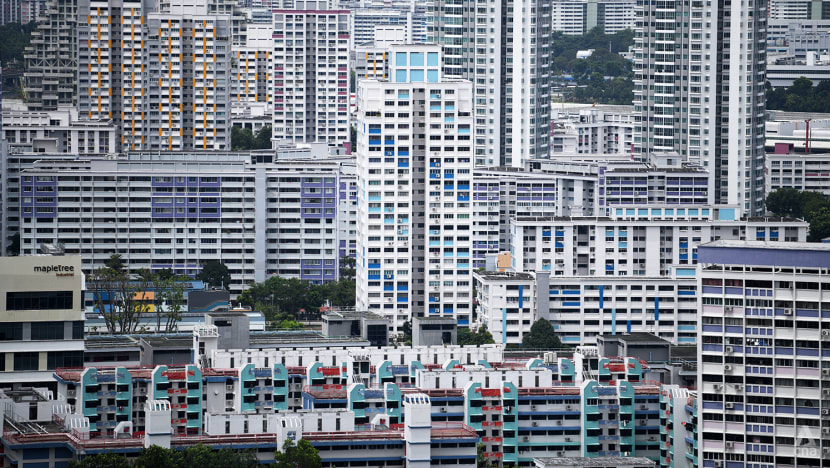After the latest cooling measures, where are Singapore property stocks headed?
Is it time to invest in property shares? Analysts tell CNA why they have not written off Singapore-listed property stocks entirely, despite the cooling measures.

HDB flats in Singapore. (Photo: CNA/Calvin Oh)
SINGAPORE: While the latest round of cooling measures for the property market is likely to dampen home sales in the near term, analysts said they have not written off Singapore-listed property stocks entirely.
In a bid to moderate demand and ensure prudent borrowing, Singapore announced late on Sep 29 another slew of property curbs. These include tighter limits on housing loans and a wait-out period of 15 months for private property owners downgrading to HDB resale flats.
The curbs came nine months after the last tranche of cooling measures in December 2021, when the Government raised additional buyer’s stamp duty rates and lowered loan-to-value limits for HDB loans.
As expected, property-related stocks took an immediate hit when the market opened the next day on Sep 30. But as the day progressed, most managed to shrug off the impact.
Among developers, City Developments ended just 0.1 per cent lower at the closing bell and GuocoLand closed unchanged. UOL even managed a relief rally by finishing 3.3 per cent higher.
Real estate agencies PropNex and Apac Realty gave up 2.6 and 1.7 per cent respectively.
This was not as marked as the hit on share prices in December last year when the previous round of cooling measures was announced.
City Developments declined 2.7 per cent then, while Guocoland and UOL lost nearly 1 per cent each. PropNex tumbled almost 4 per cent and Apac Realty skidded more than 10 per cent.
The muted market response this time could be because the latest curbs were “not that much of a surprise”, said head of OCBC investment research Carmen Lee.
Despite the pandemic’s economic impact, both the private residential and public housing resale markets have been buoyant, she added.
Official data showed private home prices rose 7.8 per cent for the first nine months of 2022, versus end-2021 levels. Prices for resale HDB flats also went up at a similar pace over the same period, said Ms Lee.
“If left unchecked, prices could rise to the point of being destabilising, leaving borrowers vulnerable.”
Mr James Ooi, market strategist at uSMART Securities, noted that there were already concerns about possible cooling measures with housing prices increasing and million-dollar HDB flat sales persisting despite rising interest rates.
“Markets could have already factored that in,” he said, pointing to the iEdge SG Real Estate Developers & Operators Index – a free-float market capitalisation weighted index that measures the performance of Singapore-listed real estate developers and operators – which fell 6.5 per cent last month.
“Therefore, when the new measures were announced, the downside impact was not as huge.”
The latest curbs were also deemed as milder than previous measures and mainly targeted at the HDB resale market, other analysts said.
“The key focus area, in our view, is to keep the HDB market affordable,” said RHB Group Research analyst Vijay Natarajan, who described the measures as “a light touch and targeted”.
“NEUTRAL” OUTLOOK
Moving forward, analysts said the fresh curbs will have a more significant impact on transaction volumes – especially that of the HDB market – compared to home prices.
This is due to the stricter financing criteria and buyers adopting a “wait-and-see” approach, said Ms Lee.
As part of the latest measures, the medium-term interest rate floor – used to compute total debt servicing ratio (TDSR) and mortgage servicing ratio (MSR) – was raised by 0.5 per cent for property loans granted by private lenders.
By doing so, authorities are tightening the criteria to assess a borrower’s ability to repay a loan.
The loan-to-value (LTV) limit for HDB loans was also lowered from 85 per cent to 80 per cent. This means that home buyers can borrow only up to 80 per cent of the flat value, versus 85 per cent previously.
Coupled with the introduction of a 15-month wait-out period for private property owners, demand at the top-end of the HDB market should slow down in the coming quarters, said Mr Natarajan.
He expects HDB resale transactions, which have fallen 16 per cent in the first eight months of the year, to drop by 20 per cent for the full year. HDB resale prices should also “slow down to more flattish levels” after rising 5 per cent in the first half of this year.
On the other hand, any negative impact on the private property market is likely to be more moderate, Mr Natarajan said.
Beyond measures imposed by the authorities, the local property market also faces other challenges such as rising interest rates and a gloomier economic outlook.
But the risks on these two fronts are “somewhat balanced by strong household balance sheet and prudent government measures”, said Mr Natarajan who has a “neutral” outlook on the sector.
Mr Ooi also has a “neutral” view for local property plays, describing the intervention by authorities as “necessary” to promote more sustainable growth in the property market, which will benefit markets in the long run.
Related:
Within the sector, developers remain largely in the good books of analysts, with City Developments and UOL among the top picks.
The former looks attractive in terms of valuations and has strong potential to ride on the recovery of the global hospitality sector, said both Mr Natarajan and Mr Ooi.
CGS-CIMB analyst Lock Mun Yee also has City Developments as a top pick, citing a potential launch pipeline of about 2,000 units that would help extend the firm’s earnings visibility from the residential market.
OCBC named UOL and CapitaLand Investment as its preferred picks. The former, which no longer has significant exposure to the Singapore residential market following a major restructuring last year, is “unscathed” from the latest property cooling measures, said Ms Lee.
Both companies also have healthy balance sheets, with net gearing ratios of 51 per cent and 28 per cent respectively as at Jun 30, as well as high interest coverage ratios, she added.
In contrast, real estate agencies PropNex and Apac Realty may hit speed bumps, analysts said. The latest curbs will likely result in “quieter volume activity in the immediate term” as market sentiment takes a hit and potential buyers evaluate their affordability.
“We believe the slower market activity could likely impact property brokers’ commission income stream in the near to medium term,” said Ms Lock, as she lowered her target prices and earnings per share forecasts for both counters in reports dated Oct 3.
That said, both stocks still possess strong fundamentals.
PropNex’s foray into the Good Class Bungalow segment and expansion of its footprint in Australia in the first half of 2022 will help the firm with new income streams, she wrote. Likewise, Apac Realty’s market and activity diversification could provide a stable base for the group.
















